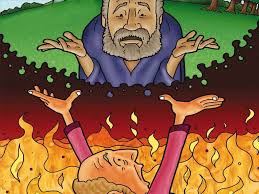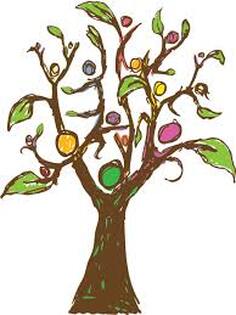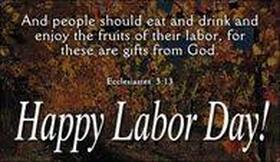
What is in a minute? A short span of time for sure, we won’t count it out now but suffice it to say that in the minute that will pass, at the rate of minimum wage of $15 an hour, a worker will 25cents a minute. During that very same minute multi-billionaire Warren Buffet will earn $25,694 dollars. Just in one minute. That is a chasm for us to ponder.
Other chasms to consider. There are currently 128,000 ultra-high net worth individuals (that’s what they’re called now) in the world – which has spawned the proliferation of exclusive stores to shop- by invitation only-- to a boon in crocodile farms (for their skins not as exotic pets). However, 1.3 billion people on our planet live in extreme poverty existing on $2 a day. 805 million don’t get enough to eat a day. 750 million lack access to clean water. Just the tip of some profound chasms in our world.
We could count many chasms around us – based on income, education, access to technology, healthcare, safety from violence, and profound moral, religious and ethical perspectives. How do we close these chasms?
Our gospel lesson could not depict our world’s moral crisis more perfectly. A rich, unnamed man is dressed in purple, a modern day Kiton 5-50 suit; coordinated with his salvadore ferrangamo shoes. At the front of his house are towering marble columns to announce his wealth to his guests. Every day he eats the finest food his chefs can offer: foie gras, brown-tipped abalone, Iranian Beluga fish caviar, lobster frittata, beef imported fresh from Argentina, bagels with white truffles. Isn’t your mouth watering just thinking of it? He spares no expense to indulge himself. He cleans his plates with left-over bread and throw it on the floor as was the custom, to be gobbled up by the dogs.
All during these sumptuous feasts there is a poor, ill man name Lazarus, whose name means “Whom God Helps” - lays at the rich man’s gates. It is noteworthy that Jesus names the poor man. Gives him an identity. Such a detail wouldn’t be given a second thought by a prominent person. A poor person was just a blip on the screen. Yet Jesus makes his needs and suffering real, just as vividly as he describes the posh lifestyle of the rich man, who ironically is not named. His wealth gives us more information than his name could. He is just known as “the rich man” whose wealth keeps him at a distance from Lazarus.
The poor man sits not on beautiful cushions but on the ground at the gates of the rich man home. He is not covered in fancy suits but sores. He is ravishingly hungry, longing for even the throw-aways from the table that the dogs get. The rich man knows of Lazarus’ plight, yet he did nothing for Lazarus. He could’ve helped but didn’t. His focus is solely on himself and his own comforts. The only one who intervenes on behalf of Lazarus are the dogs, who lick his sores.
Then in a minute - everything changes. Lazarus dies and is carried away by angels to Father Abraham where he finally receives comfort that has longed evaded him. It is a figurative phrase that appears to have been drawn from a popular belief that the righteous would rest by Abraham's side in the world to come, an opinion described in Jewish literature at the time of Jesus. Figuratively, as in this case, it refers to a place of honor reserved for a special guest, a place that Lazarus now enjoys.
Then the rich man dies and he ends up in Hades where he is tormented by eternal flames which are a startling new experience. In the first part of the parable there is no dialogue. The Rich man is self-sufficient but now the rich man, in need, cries out over and over again to Abraham. He’s rich, he’s used to getting his way. He is in great torment. He wants Lazarus, who he ignored in life, to come now and dip his figure in water and cool his tongue. Can’t be done, says Father Abraham. Then the rich man wants Lazarus sent to his father’s house to warn his brothers of Hades and to amend their ways. Abraham again says no, they have Moses and the Prophets - that is enough. Throughout the entire story Lazarus is silent, but his place at Abraham’s side makes him righteous. The first part of the parable describes Lazarus’ torment – the second half tells the torment of the rich man. In both scenes there is a chasm. A chasm created not because the Rich Man had wealth but because he didn’t use his resources to help and share with those in need. Instead he ignored and built a chasm between the haves and have nots, resulting in a chasm between heaven and hell.
Even in the afterlife the rich man is only concerned to alleviate his torment. He doesn’t ask how he got there. He shows no curiosity how he contributed to his situation. He doesn’t apologize to Lazarus for not helping him. There is a chasm in his awareness and actions that results in his eternal punishment. He seems totally unaware of his sins and only focused on his comfort and the comfort of his family. Therefore, a chasm remains in the rich man’s heart, enveloped now by the pain of Hades. So, as a result there is a great chasm that exists in the parable in the space between Heaven and Hades. The focus of the parable is that the chasm in our world is real and God wants us to fix it. God is not going to send Lazarus to us to lead us to repentance. God wants us to follow the Scriptures, the teachings of Jesus which teaches us to close the chasm in our hearts, in our lives, in the world we live in.
The truth is, we all experience different sorts of chasms in our life.
Once there was an article in the New York Times Magazine about Dale Earnhardt, Jr. a popular Nascar driver. He is the son of the legendary Dale Earnhardt, Sr., the great car racer, who died in 2001 after crashing at the Daytona 500. In this article he shared about the chasm he experienced in his relationship with his father: “My daddy… never really did anything with me. He never told me things. We were raised by six or seven nannies. I always thought he felt I wasn’t much like him.” This chasm in the relationship with his father still impacts him. At 35 he said, “I don’t want to get married and divorced like my dad.” In fact, “He lives alone… (and) plays video games by himself eight hours at a clip. He’s a multimillionaire, yet he lived alone for months in a 20-by-20 garage loft.” (New York Times Magazine, August 8, 2010).
What a chasm caused by fame and achievement, where relationships take a back seat. Many of us experience these painful chasms within our relationships. Misunderstandings, disagreements, different beliefs and morals, lack of expressing help, ignoring other’s needs, that can keep us apart, creating chasms we fail to close. How will we close the chasms around us? Any ideas?
Everyone has to find out what works for them to close the chasm. It might be volunteering at a nursing home or assisting someone who is ill. Giving an extra tithe or offering, especially with the peace and global witness season upon us? How about inviting someone new out for coffee or tea? Advocating for issues that matter to our world? We need to take that minute. Open our eyes, hear the call, and close a chasm. That’s what we’re called to do.
The good news is that Jesus Christ closed the greatest chasm of all. Jesus took on flesh, reached out to all kinds of sinners, self-absorbed indifferent rich men like the rich man in the parable and helpless crippled beggars like Lazarus. Jesus was clothed with a purple robe, just like the one the rich man in the parable wore. And later that same day Jesus, like Lazarus who had been thrown out at the gate of the rich man, was literally thrown down outside a gate of Jerusalem and nailed to a cross. Jesus died on the cross to reconcile us to God, to bridge the great chasm, and to give us the hope that the great chasm that divides us from others will close or be eliminated. Jesus rose from the dead to be that sign: the chasm can be closed, just follow him.
So today, whether we are like the rich man, self-absorbed and indifferent to the needs of others, or like Lazarus, feeling alone and helpless in our suffering, the good news is that God in Jesus has bridged the chasm. The chasm between us and God is no more. And we can be chasm-closers too.
So, let’s take a minute, do the things to close the chasm. Give the money. Feed the poor. Be reconciled. Be involved. Put the needs of others first. Turn to Jesus. Then one day not only will we find the chasm between us and the ones we love bridged, we will also find ourselves in the bosom of our Heavenly Father. It’ll take just a minute. Amen
http://www.christchurchcville.org/wp-content/uploads/2010/09/Sermon-9-26-10.pdf




 RSS Feed
RSS Feed